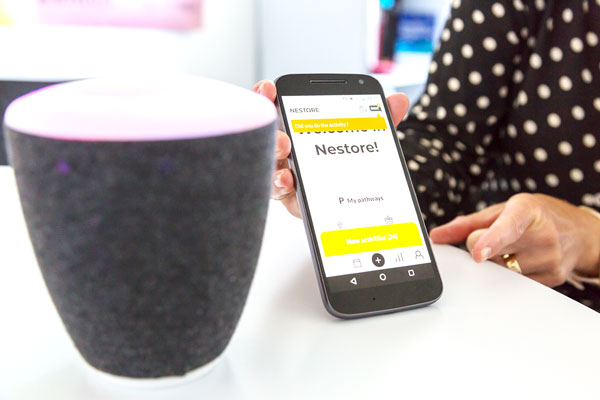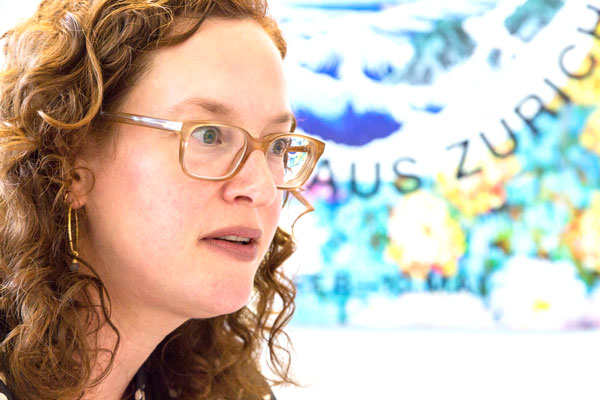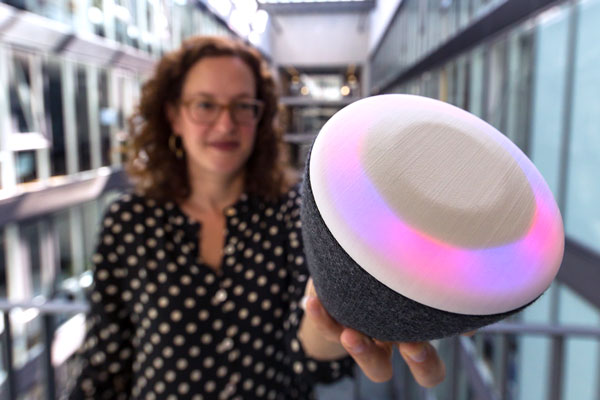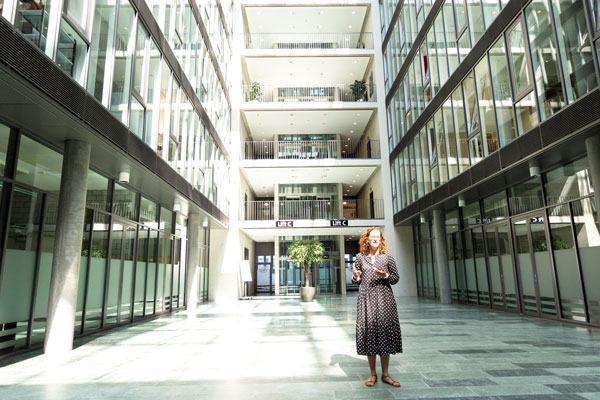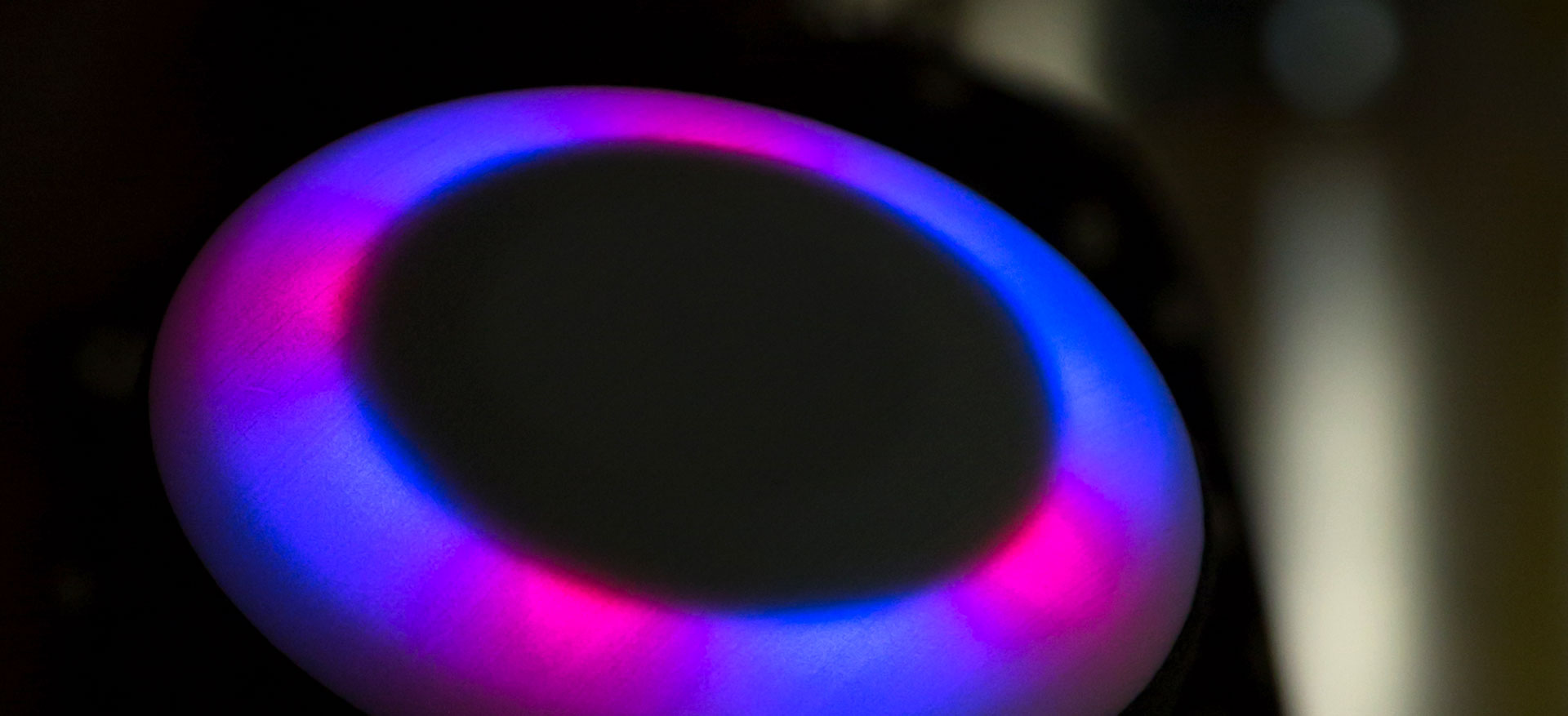
NESTORE, your personal coach in old age
In an EU project, lifespan psychologist Christina Röcke develops a digital coach that motivates users to strengthen their physical, emotional and cognitive abilities by individually coaching them.
Dr. Röcke, what are the apps that ensure your own wellbeing?
Christina Röcke: Especially during the lockdown situation it was important to me that I was able to send texts and pictures from my smartphone. I also rediscovered Skype to maintain a virtual exchange with friends, for example. Both possibilities contributed to my wellbeing.
Do you use a fitness app?
I have been wearing a Fitbit Tracker for two years, which counts my steps. But I wear it irregularly, usually at times when I need to be motivated to take some exercise. I have to admit that I am very susceptible to the fireworks that the pedometre displays after 10,000 steps (laughs).
Are apps like these capable of sustainably changing our behaviour regarding physical activity?
Whether there will be a sustainable change in behaviour depends on various factors. For example: If anything, is the person willing to change his or her behaviour? People who hardly ever move know that they should become more active. A change in behaviour requires that the person wants this change in the first place. What is more, it has been shown that a behavioural change is sustainable if the person plans well and monitors his or her own behaviour and is being supported and motivated.
By means of a Fitbit fireworks display?
Exactly. Every human being needs resonance and appreciation. Especially when you lack motivation or find it difficult, for example, to exercise regularly, what you need is encouragement, a motivating prompt and a personal feedback.
There are numerous health applications. In the EU project NESTORE you develop a digital coach for people from the age of 60. What is the difference between this app and the ones that already exist?
Most apps either offer a fitness programme or a nutrition programme or games to activate brain performance. If you want everything, you need three different apps or devices that independently prompt you to exercise. It might cause stress, having to do the exercises from three or more apps every day.
«Every human being needs
resonance and appreciation.»
We are developing a digital coach that focuses on all abilities that are vital for one’s wellbeing and that should be strengthened during the physiological and psychological ageing process: Physical activity, good nutrition, social interaction and cognitive skills. The coach and advisor NESTORE is intended to support the user in preserving these abilities for as long as possible. To this end, the app suggests structured trainings such as gymnastics exercises as well as activities that the user can easily integrate into his or her daily routine.
For example?
For example, NESTORE could recommend that a user combine a visit from her daughter with a walk in the park. By this, she experiences both social contact and physical activity.
NESTORE responds to the respective person?
Yes, this is the key factor to motivate a person in the first place. We all hope that our counterpart appreciates and is responsive to our presence. The coach is tailored to the corresponding person. This is why the mythological Greek hero Nestor, who had wisely advised King Agamemnon during the Trojan War, inspired us to choose his name for our project. We attach great importance to this individualisation, as people after their retirement are often lumped together as the «group of old people». This has just been demonstrated when the corona risk group was defined: Everyone over 65 is in that group. However, this group is more heterogeneous in many areas than the group of people between 15 and 55. I reject the notion that everyone over 65 is the same. The result of this assumption is that the individual person is no longer perceived.
How does the digital coach know who it is counselling?
Before users can implement their personal coach, they are asked about their medical condition, their interests, their social situation, their strengths and weak points. Questions may include whether a person lives alone, whether there are pets, whether he or she lives in the city or in the countryside; does this person have a hobby or does he or she feel lonely and so on. Based on this information, the coach then comes up with suggestions.
«NESTORE is intended
to support the user
in preserving the abilities
that are pivotal for healthy ageing
for as long as possible.»
However, the coach would not recommend to go dancing if the person does not like to dance. Someone who attends sports classes three times a week will not be asked to do press-ups. The coach repeatedly asks the users how they are doing. If they feel lonely, it suggests going out to drink their coffee, for example. The coach first has to get acquainted with the users’preferences, interests and habits. This is why there is an initial two-week trial phase during which the profile is being completed. After three months, the NESTORE counselling is evaluated.
Is this kind of personal digital coach not a utopia?
Indeed, we are developing a highly complex system – particularly because we are also incorporating the psychological and cognitive levels. We want to develop a digital coach that counsels in a holistic and individualised way. Someone has to start. Once there is an available prototype of such a digital coach, it can be improved continuously.
The app collects great amounts of private and personal data.
Yes, data privacy is a challenge. I believe that we have to rethink data protection. We closely followed the discussion about the corona tracing app with its decentralised data storage. For our coach, we also intend to establish a decentralised storage solution: The data shall stay with the user and he or she alone decides about whom to share it with.
We live longer and also remain both mentally and physically fit for longer. What are the greatest challenges in old age these days?
It is true, we live significantly longer than 50 years ago and also remain healthier as we get older. The subjective life satisfaction in Switzerland is high into old age, according to surveys. They also show that people in Switzerland feel healthy into old age as well. A considerable risk for older adults is social isolation. Loneliness, as many studies have confirmed, affects not only mental but also physical health.
How are wellbeing and health defined today?
In 2015, the World Health Organization suggested a definition of health that goes beyond the physical condition. The person is considered in his or her physical and mental entirety and as a being who requires social relationships and pursues personal goals. This definition assumes an individual and dynamic wellbeing: Wellbeing at the age of 25 may be different from that at 80. For a young person, mobility impairment may represent a substantial restriction in the quality of life; for an older person, this may not be that difficult, as long as other personally important things are still possible at the same time.
During the past months, those over 65 were told to stay at home. Some nursing home residents were no longer allowed to go outside or receive visitors. Would NESTORE have been able to improve their wellbeing?
Yes, I believe that our digital coach could have helped these residents to feel less lonely. It could have given them the impression that there is someone looking after them. It could have suggested, for example, that a user call her grandchildren or perform physical exercises or play a game of strategy on her tablet. Social control often carries a negative connotation these days; however, social control seen positively also means care.
«I reject the notion t
hat everyone over 65
is the same.»
This is the purpose of NESTORE: To take care a bit and make sure that the users keep physically and mentally fit and do not grow lonely. This is why the digital coach does not only consist of sensors, an app on a smartphone or a tablet and a bracelet with a motion sensor, but also of a soft object that can be touched and talked to.
Should it not be the task of human beings to take care of one another?
Indeed, it is still best if older adults are embedded in a social, caring network. However, today, many relatives no longer live nearby, in the cities one often does not even know the neighbours, and in nursing homes there is hardly enough time to meet the emotional and physical needs of the individual residents. Our digital coach merely tries to fill a gap.
What sparked your interest in the elderly?
It just came to me. Back in 1996, before taking up my studies in psychology, I wanted to spend a few months in the United States. I needed to reassure my parents that the time there would be well spent and so I signed up for an internship in a clinic in the countryside. Once arrived, I saw that it was a geriatric clinic. I had never heard of the terms «geriatrics» and «gerontology». Back then, the States were much more advanced in the field than Germany. As a trainee I learnt that there is no such thing as «old people» – and I realised that older age opened an extensive field of research for me. This internship made me an advocate for older adults.
Interview with Christina Röcke (in german language)
Christina Röcke
Christina Röcke is the Deputy Director and a Research Group Head of the University Research Priority Program (URPP) «Dynamics of Healthy Aging» at the University of Zurich (Switzerland). In her PhD thesis at the Freie Universität Berlin and at the Max Planck Institute for Human Development (both in Germany), the Berlin-born researcher analysed the subjective wellbeing and its daily variations; among other things, she compared the daily wellbeing of young adults to that of older adults. Similarly, her research at the University of Zurich deals with emotional health and wellbeing during middle and late adulthood and everyday activities related to it. The three-year project NESTORE, funded by the EU with five million euros and in which the University of Zurich collaborates with 15 partners, is expected to come to a close in the early summer of next year. This date depends on whether researchers will again be allowed to interview people over 65 anytime soon, as they are defined as a SARS-CoV-2 risk group.
Horizon 2020 project
NESTORE: Novel Empowering Solutions and Technologies for Older people to Retain Everyday life activities
- Programme: collaborative project
- Duration: 42 Monate
- Contribution for University Zurich: 292’500 €


